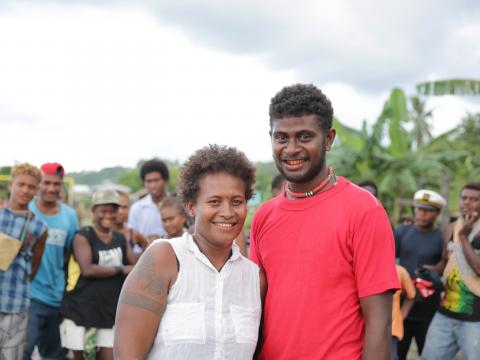World Vision launches four-year initiative focused on empowering youth in the most rural Solomon Islands communities

World Vision recently launched the Youth Social and Entrepreneurship Development project (YSED), which aims to reach 2,000 youths in 20 communities in North and East Malaita, Solomon Islands. This four-year project, supported by the New Zealand Government, focuses on creating opportunities for youth to enable them to play positive roles in their communities, and to channel their high energy toward new initiatives, especially those that generate incomes for themselves and their families. As youth are engaged, involved in community activities and making positive life choices, the initiative will help build positive perceptions of youth as future leaders in society, as they start to realize a vision for their lives and the potential they can have.
Solomon Islands is one of the poorest countries in the South Pacific, and globally is ranked 156 out of 188 nations according to the 2016 UNDP Human Development Index. North and East Malaita specifically observes some of the lowest literacy rates as well as highest levels of poverty. While youth here face many challenges, World Vision’s experience working with young people has been that they are highly motivated and energised when engaged in initiatives that help them to develop economically, socially and as future leaders. All they need is an opportunity to prove it.
This initiative aims to reach young people who may have been on the margins or dropped out of school early, giving them a second chance in learning skills that can help build a better future for themselves and communities. A strong emphasis will be placed on empowering more youth to become leaders in their communities, bridging them to opportunities that are available to generate income and save for their futures, giving them entrepreneurial skills necessary to support any businesses they may wish to start, and finally cultivating their creative energies toward building solutions that help their community and families.
“It’s an opportunity for youths in the community who dropped out of education to have further alternatives for learning and continue to build a better future. Most youths are currently seen as liabilities in their communities but we want to change that by empowering them to become social assets to the community and participate actively in community development.” said George Ganiau, World Vision's Youth Social Entrepreneurship Development Project Manager.

World Vision realises that any efforts to reach youth cannot happen in a silo if it is to be sustainable; it will take a concerted effort by a wide array of stakeholders, from government, to the private sector, local businesses, the church, communities themselves, to also realise their roles in empowering youth in the long term. By working in close partnership with these stakeholders from the beginning, ensuring that youth themselves are being empowered to build relationships with local government, the private sector, and community leaders throughout the project, and continually advocating for the empowerment of youth, World Vision hopes to ensure that the impact of the initiative extends beyond the life of the project.
World Vision looks forward to progressing this programme with partner communities over the next couple of months.